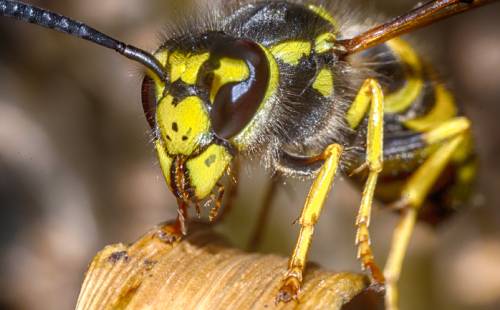June Pest of the Month: Yellowjacket Wasps
The sound of the lawnmower, the laughter of children, and the buzz of bees are all signs that summer is here. However, the fear of a wasp sting can spoil the season for many people. In the UK, there are hundreds of different types of wasps, with the most common being the yellowjacket (Vespula vulgaris) which has black and yellow markings on its abdomen. Yellow jackets are often mistaken for hornets or paper wasps, but they can be distinguished by their black antennae and thicker bodies. They may also have white and red markings alongside their yellow and black patterns. However, due to their aggressive nature, it may be difficult to get a close enough look to tell them apart. When faced with these territorial pests, at Urban Pest Control, the leading wasp nest removal company in Dorset, we aim to provide same-day assistance to our customers.
Interesting facts about yellowjacket wasps:
- Wasps are attracted to light and have been reported to gather around attic and outdoor lights.
- Yellowjacket wasps are typically 12mm in size, but the queen wasp is larger at 19mm.
- Queens emerge in late spring or early summer to build a nest using paper-like material, lay eggs, and create brood cells. The eggs hatch, and the queen feeds the larvae for 18-20 days. Infertile females become workers that emerge in midsummer to expand the nest and forage for food. The queen continues to lay eggs, and the workers take care of them, resulting in a nest with up to 10,000-15,000 cells
- Wasp nests are constructed from chewed cellulose derived from plant and wood fibres. They are typically found in hollow logs, under bark, soil, and leaves. However, they can also inhabit human structures that provide easy access to the outside, such as wall cavities, roof spaces, eaves, bird boxes, sheds, or garages.
- Young yellowjacket larvae feed on insects brought to them by worker wasps, while adult yellowjackets feed on sugary substances like flower nectar, fruit, and even canned drinks when they find them.
- Wasps can sting multiple times, and in the UK there are on average 5 deaths due to anaphylaxis from bee or wasp stings each year. Wasp stings cause twice as many deaths due to anaphylaxis as bee stings, with 80% of these incidents occurring in men.
- A dying yellowjacket releases an alarm pheromone that alerts other wasps. Within 15 seconds, you could be surrounded by wasps coming to aid the dying wasp.
- Only a single mated queen survives the winter, ready to build a new colony in the following spring.
How to recognise you have a yellowjacket wasp issue:
- A continuous loud buzzing sound may indicate a large volume of wasps.
- Strange scratching and crackling sounds from walls may be heard as wasps continue to expand their nests.
- Wasps found in rooms without open windows.
- If you notice many wasps returning to a certain area, observing their flight path can help you locate the nest.
How to prevent yellowjacket wasps:
It is important not to approach a live wasp nest, as wasps swarm and sting if they feel threatened. Leave nest removal to the experts.
- Regularly maintain possible entry points to prevent wasps from building nests in cracks or crevices.
- Eliminate potential food sources by removing food, such as fallen fruits from trees, promptly.
- Place wasp traps around your garden if it is prone to wasp nests.
- Install fly screens on doors and windows to prevent wasps from entering your property.
Wasp Control Services
It is strongly advised not to attempt removing a wasp nest, especially if you have a sensitivity to stings. Disturbing a nest will provoke the wasps, and it is best to leave nest removal to professionals. Urban Pest Control is a friendly local company with fully qualified specialists in wasp nest removal, and we can tackle wasp nests up to a height of nine metres. Our experts hold RSPH level 2 certification in pest management and use effective methods while equipped with the necessary safety gear to complete the treatment quickly and safely.
Visit our wasp nest removal page for more information on our professional wasp control services. If you require assistance with wasps in Poole, Bournemouth, Christchurch, Dorchester, Weymouth or the surrounding areas, please do not hesitate to contact us.



